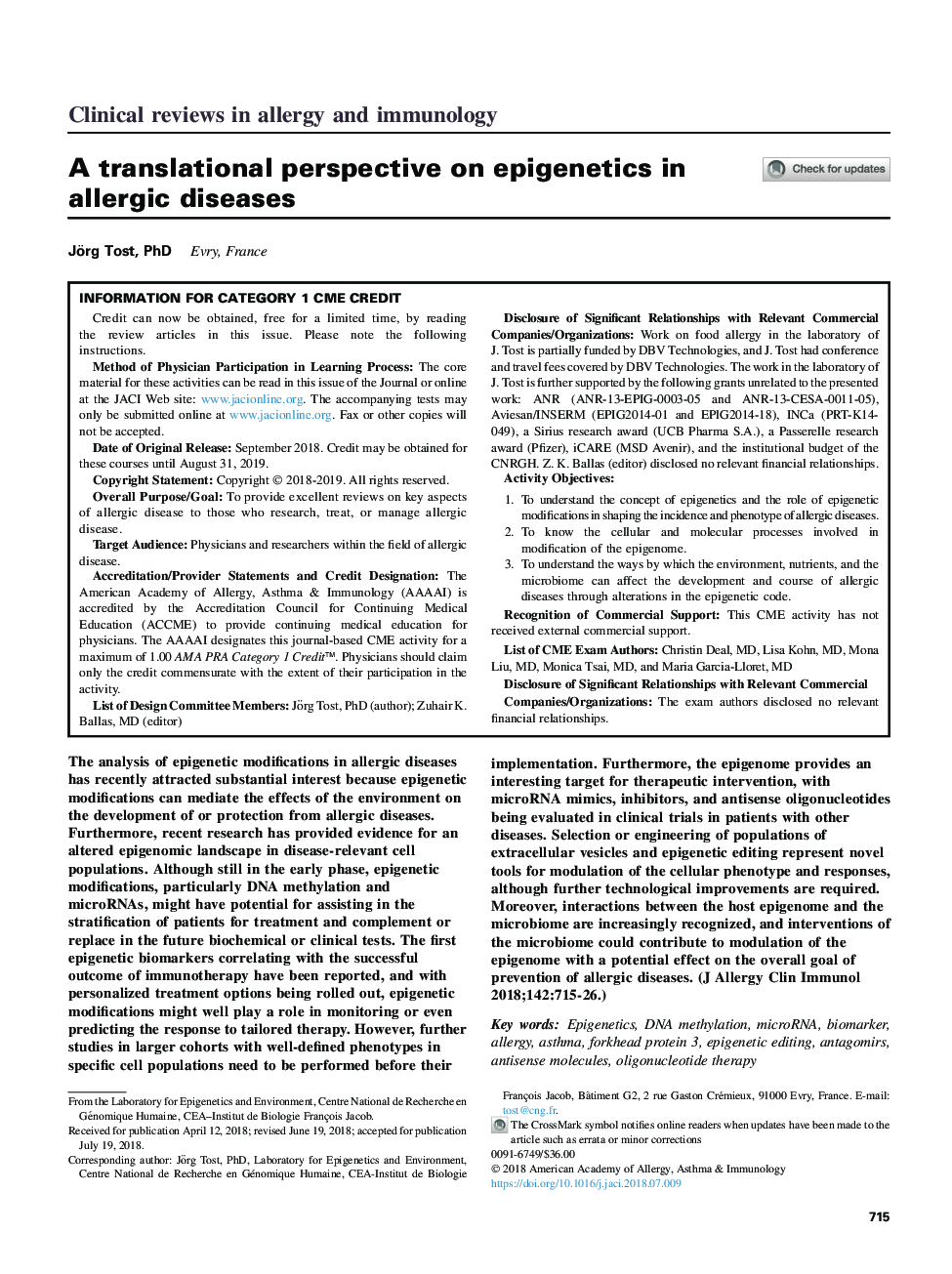| کد مقاله | کد نشریه | سال انتشار | مقاله انگلیسی | نسخه تمام متن |
|---|---|---|---|---|
| 8963673 | 1646629 | 2018 | 12 صفحه PDF | دانلود رایگان |
عنوان انگلیسی مقاله ISI
A translational perspective on epigenetics in allergic diseases
ترجمه فارسی عنوان
چشم انداز ترجمه ای در مورد اپی ژنتیک در بیماری های آلرژیک
دانلود مقاله + سفارش ترجمه
دانلود مقاله ISI انگلیسی
رایگان برای ایرانیان
کلمات کلیدی
موضوعات مرتبط
علوم زیستی و بیوفناوری
ایمنی شناسی و میکروب شناسی
ایمونولوژی
چکیده انگلیسی
Information for Category 1 CME CreditCredit can now be obtained, free for a limited time, by reading the review articles in this issue. Please note the following instructions.Method of Physician Participation in Learning Process: The core material for these activities can be read in this issue of the Journal or online at the JACI Web site: www.jacionline.org. The accompanying tests may only be submitted online at www.jacionline.org. Fax or other copies will not be accepted.Date of Original Release: September 2018. Credit may be obtained for these courses until August 31, 2019.Copyright Statement: Copyright © 2018-2019. All rights reserved.Overall Purpose/Goal: To provide excellent reviews on key aspects of allergic disease to those who research, treat, or manage allergic disease.Target Audience: Physicians and researchers within the field of allergic disease.Accreditation/Provider Statements and Credit Designation: The American Academy of Allergy, Asthma & Immunology (AAAAI) is accredited by the Accreditation Council for Continuing Medical Education (ACCME) to provide continuing medical education for physicians. The AAAAI designates this journal-based CME activity for a maximum of 1.00 AMA PRA Category 1 Creditâ¢. Physicians should claim only the credit commensurate with the extent of their participation in the activity.List of Design Committee Members: Jörg Tost, PhD (author); Zuhair K. Ballas, MD (editor)Disclosure of Significant Relationships with Relevant Commercial Companies/Organizations: Work on food allergy in the laboratory of J. Tost is partially funded by DBV Technologies, and J. Tost had conference and travel fees covered by DBV Technologies. The work in the laboratory of J. Tost is further supported by the following grants unrelated to the presented work: ANR (ANR-13-EPIG-0003-05 and ANR-13-CESA-0011-05), Aviesan/INSERM (EPIG2014-01 and EPlG2014-18), INCa (PRT-K14-049), a Sirius research award (UCB Pharma S.A.), a Passerelle research award (Pfizer), iCARE (MSD Avenir), and the institutional budget of the CNRGH. Z. K. Ballas (editor) disclosed no relevant financial relationships.Activity Objectives:1.To understand the concept of epigenetics and the role of epigenetic modifications in shaping the incidence and phenotype of allergic diseases.2.To know the cellular and molecular processes involved in modification of the epigenome.3.To understand the ways by which the environment, nutrients, and the microbiome can affect the development and course of allergic diseases through alterations in the epigenetic code.Recognition of Commercial Support: This CME activity has not received external commercial support.List of CME Exam Authors: Christin Deal, MD, Lisa Kohn, MD, Mona Liu, MD, Monica Tsai, MD, and Maria Garcia-Lloret, MDDisclosure of Significant Relationships with Relevant CommercialCompanies/Organizations: The exam authors disclosed no relevant financial relationships.The analysis of epigenetic modifications in allergic diseases has recently attracted substantial interest because epigenetic modifications can mediate the effects of the environment on the development of or protection from allergic diseases. Furthermore, recent research has provided evidence for an altered epigenomic landscape in disease-relevant cell populations. Although still in the early phase, epigenetic modifications, particularly DNA methylation and microRNAs, might have potential for assisting in the stratification of patients for treatment and complement or replace in the future biochemical or clinical tests. The first epigenetic biomarkers correlating with the successful outcome of immunotherapy have been reported, and with personalized treatment options being rolled out, epigenetic modifications might well play a role in monitoring or even predicting the response to tailored therapy. However, further studies in larger cohorts with well-defined phenotypes in specific cell populations need to be performed before their implementation. Furthermore, the epigenome provides an interesting target for therapeutic intervention, with microRNA mimics, inhibitors, and antisense oligonucleotides being evaluated in clinical trials in patients with other diseases. Selection or engineering of populations of extracellular vesicles and epigenetic editing represent novel tools for modulation of the cellular phenotype and responses, although further technological improvements are required. Moreover, interactions between the host epigenome and the microbiome are increasingly recognized, and interventions of the microbiome could contribute to modulation of the epigenome with a potential effect on the overall goal of prevention of allergic diseases.
ناشر
Database: Elsevier - ScienceDirect (ساینس دایرکت)
Journal: Journal of Allergy and Clinical Immunology - Volume 142, Issue 3, September 2018, Pages 715-726
Journal: Journal of Allergy and Clinical Immunology - Volume 142, Issue 3, September 2018, Pages 715-726
نویسندگان
Jörg PhD,
